Key takeaways:
- Anti-war activism fosters empathy by revealing the true costs of war, prompting collective action for peace.
- Advocacy empowers individuals to influence policies and build connections across diverse backgrounds, promoting social change.
- Setting achievable goals is crucial in sustaining motivation, allowing advocates to celebrate small victories and adapt to setbacks.
- Building a supportive community provides emotional reinforcement, enhancing resilience and motivation in advocacy efforts.
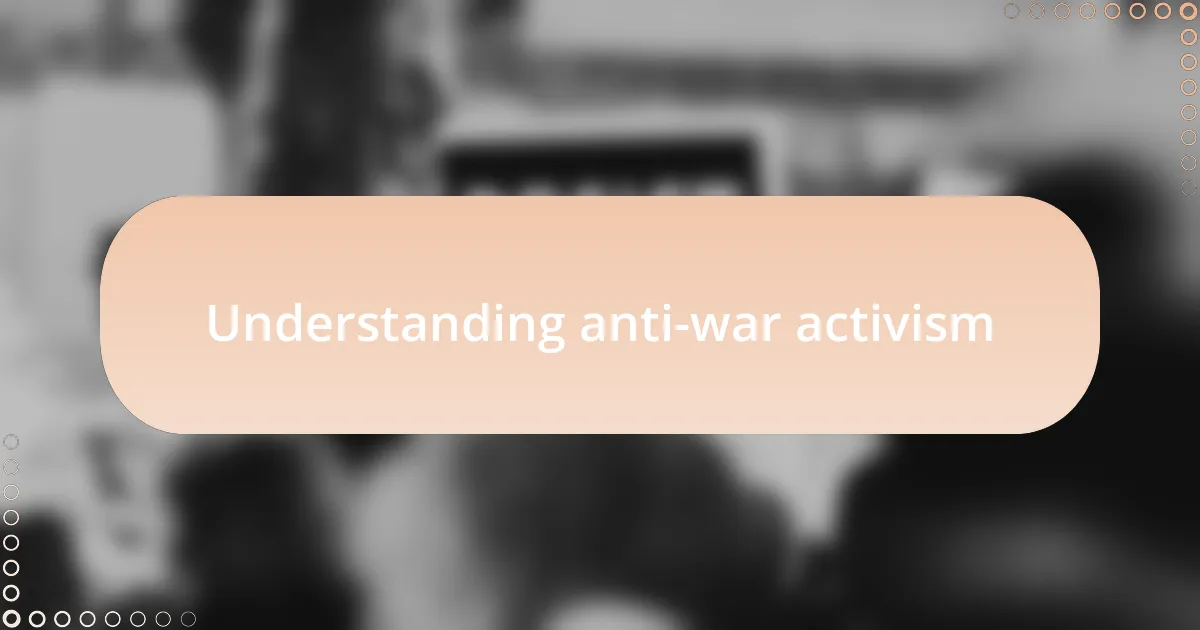
Understanding anti-war activism
Anti-war activism is rooted in the belief that war leads to suffering, displacement, and widespread destruction. Reflecting on my own experiences, I remember attending a rally where a mother shared her story about losing her child to a conflict. Her pain resonated deeply with everyone present, igniting a collective resolve. How can we ignore such heart-wrenching realities?
At its core, anti-war activism questions the narratives promoted by those in power. I often find myself pondering: What would happen if more people demanded to see the true costs of war, not just the glorified versions presented in the media? When I engaged in conversations about these harsh truths, I noticed how quickly perspectives can shift. It’s as if unveiling the realities allows people to empathize on a more profound level.
Moreover, this movement thrives on unity and collaboration across diverse backgrounds. I vividly recall a local gathering where individuals from various walks of life came together, sharing insights and experiences. That moment reminded me of the power of collective voices advocating for peace. Isn’t it exhilarating to think that each one of us can contribute to reshaping the dialogue around war?
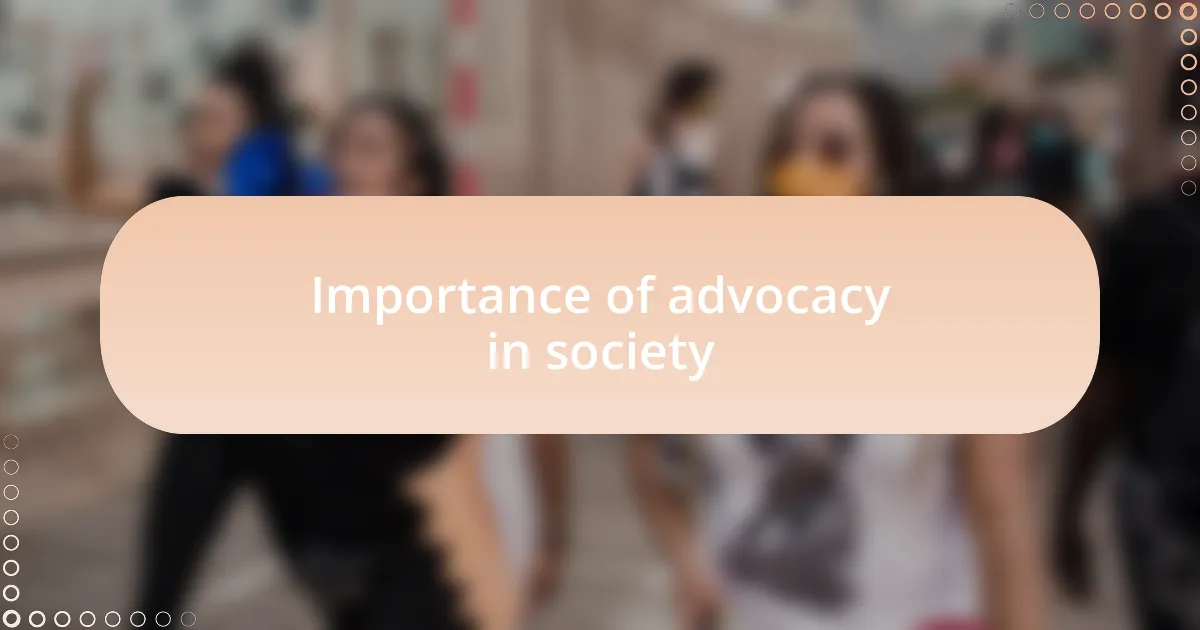
Importance of advocacy in society
Advocacy plays a crucial role in shaping societal values and inspiring change. I remember attending a community meeting where we discussed local war-related issues. The passion in the room was palpable, with each participant sharing their thoughts and experiences. It struck me how advocacy gives people a voice, empowering them to influence policies that impact their lives and communities.
Engaging in advocacy helps bridge gaps between various groups, fostering understanding and compassion. One time, while volunteering at a youth center, I witnessed young activists from diverse backgrounds team up to address the consequences of war on their neighborhoods. Their collaboration not only highlighted the issues but also demonstrated how advocacy can build camaraderie and collective action. Isn’t it fascinating how shared experiences can unite even the most unlikely allies?
Furthermore, advocacy urges society to confront uncomfortable truths and challenge the status quo. Reflecting on my own journey, I recall a moment of clarity when I realized that simply discussing these issues isn’t enough; we must actively seek solutions. This dedication to truth fosters a vibrant civic discourse that ultimately strengthens democracy. How else can we evolve as a society if we don’t actively engage in these vital conversations?
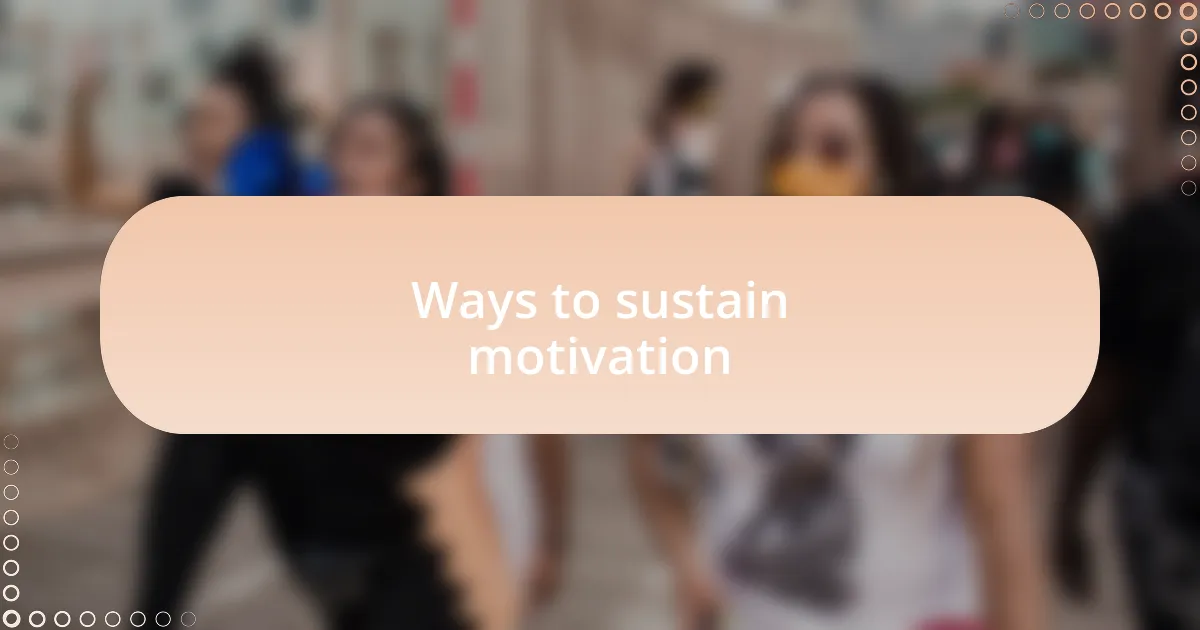
Ways to sustain motivation
Finding ways to sustain motivation in advocacy can be a challenge, but I’ve discovered a few strategies that really work for me. One key aspect is to set small, achievable goals. For instance, after participating in a rally, I made it a point to follow up by writing a letter to my local representatives. It was gratifying to see my advocacy efforts lead to tangible actions, reminding me that every little bit counts.
Another approach involves drawing inspiration from stories of resilience. I often revisit the accounts of historical figures or current activists who have fought tirelessly against injustice. I vividly recall reading about a woman who started a grassroots movement in her community that transformed local legislation. Her perseverance motivates me on days when I feel overwhelmed, reminding me that lasting change is often born from persistence and hope.
I also try to surround myself with like-minded individuals. This camaraderie has been invaluable; sharing experiences and challenges with fellow advocates helps reignite my passion. Just last month, I attended a workshop where we exchanged our battles and victories. It was an invigorating reminder that I’m not alone in this fight. Have you ever found your spark reignited simply through connection? I know I have, and that energy can truly propel your advocacy journey forward.
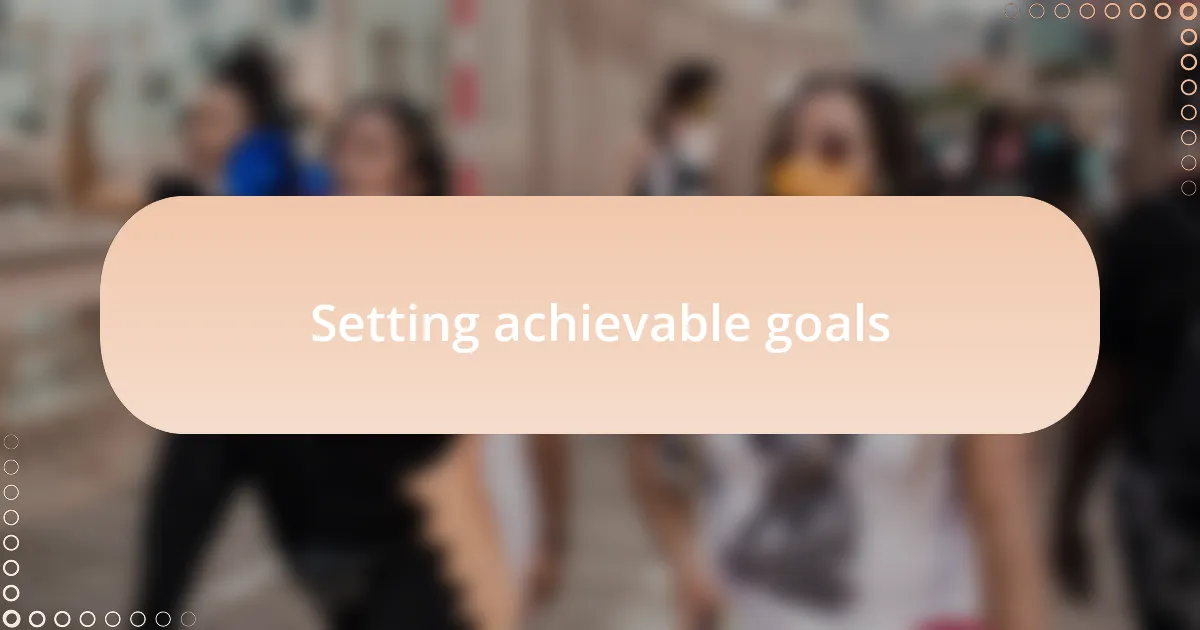
Setting achievable goals
Setting achievable goals has been a game changer for my advocacy work. I remember when I decided to focus on a single issue, like promoting peace education in local schools. Breaking it down into steps made it much more manageable. Instead of overwhelming myself with a grand plan, I simply aimed to connect with one teacher, share resources, and gradually expand my reach. Isn’t it amazing how small victories can create a sense of momentum?
There’s something powerful about celebrating these incremental achievements. I recall the thrill I felt when my first presentation at a local school was met with enthusiastic support. It reminded me that setting clear, realistic goals not only helps me stay motivated, but it also builds a foundation for larger initiatives down the line. Have you ever experienced that rush of excitement when your efforts pay off, no matter how small? It’s that feeling that fuels my dedication.
Even when setbacks occur, which they often do in advocacy, I remind myself of the importance of patience. Each setback is just a stepping stone to the next goal. When I faced difficulties in gathering support, I revisited my goals and adjusted them accordingly. Whether it meant altering my timeline or refining my focus, this adaptability has kept my passion alive. Have you found that flexibility in your own journey makes a difference? For me, it reinforces the idea that every effort counts, and every adjusted goal can lead to greater success in the future.
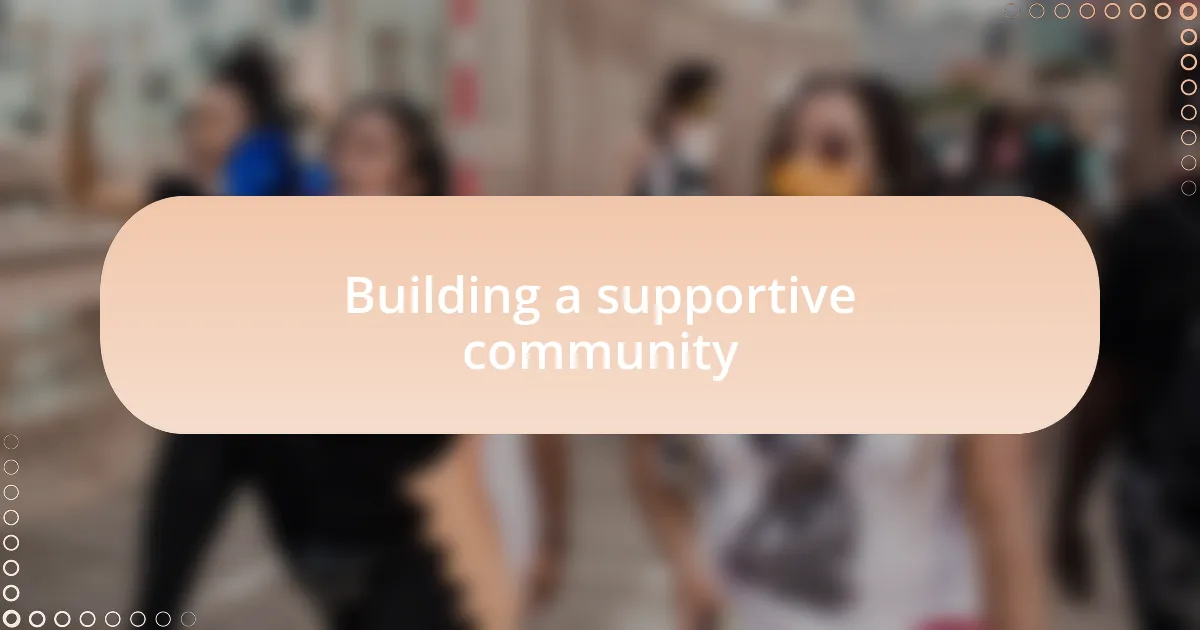
Building a supportive community
Building a community of support has truly transformed my experience as an advocate. I’ll never forget the time I organized a small gathering with like-minded individuals who were just as passionate about peace as I was. We shared ideas, resources, and challenges over coffee, and by the end of our meeting, I felt recharged and inspired. Could you imagine the impact of finding a group where everyone understands your struggles and celebrates your victories? It’s a unique bond that’s hard to replicate elsewhere.
One of the key moments in my advocacy journey was when I volunteered for a local anti-war organization. It was here that I discovered the strength of teamwork. Together, we organized campaigns, and each person brought their own strengths to the table. I learned that when we uplift one another, we amplify our collective voice. Have you ever been part of something that made you feel like your efforts were part of a larger purpose? It was during those moments that I truly understood the power of community.
As I look back, I realize that emotional support is just as crucial as practical assistance in our advocacy efforts. There were times when I faced burnout and doubt. Fortunately, my friends in the community didn’t let me go down that path alone. They checked in, offered encouragement, or simply listened to my frustrations. When was the last time someone did that for you? Those caring connections made all the difference, reminding me that we are in this together, and it is that sense of belonging that continues to motivate me every day.
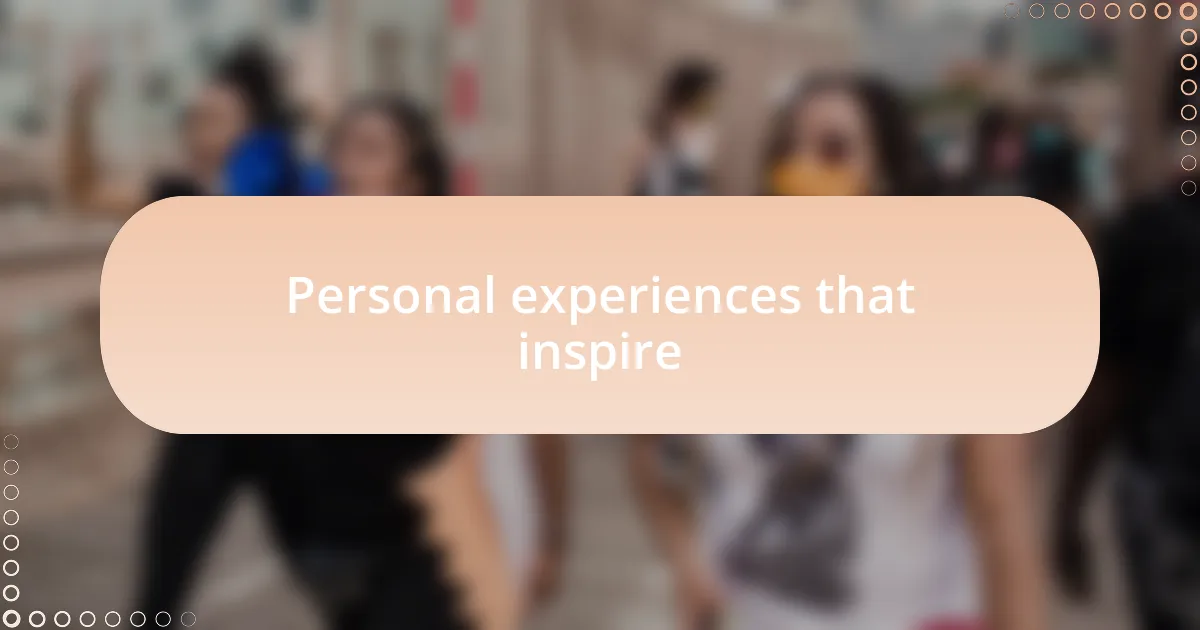
Personal experiences that inspire
There was a time when I attended a protest that rattled my very core. As I stood among hundreds of passionate individuals, chanting for peace, I felt an overwhelming sense of purpose wash over me. In that moment, I wasn’t just an advocate; I was part of a powerful movement that challenged the status quo. It made me think, have you ever felt that electrifying connection with a crowd that fueled your determination?
Another defining experience was when I spoke at a local school about the impact of war on families. I shared my own story of how conflict had affected a loved one, and afterward, a young student approached me in tears. She voiced her fears and confusion about the world. That encounter stirred something within me—a reminder of why I fight. Have you ever considered how your experiences might inspire others? It drove home the idea that our personal narratives can spark change and clarity for those seeking answers.
Lastly, I often find inspiration in the stories shared by people directly affected by war. Listening to a veteran recount their experiences reminded me of the cost of conflict. It was a heartbreaking yet enlightening moment that ignited my dedication even further. Isn’t it profound how hearing someone else’s journey can stir emotions and convictions within us? These personal connections not only fuel my drive but also reinforce the importance of storytelling in advocacy.
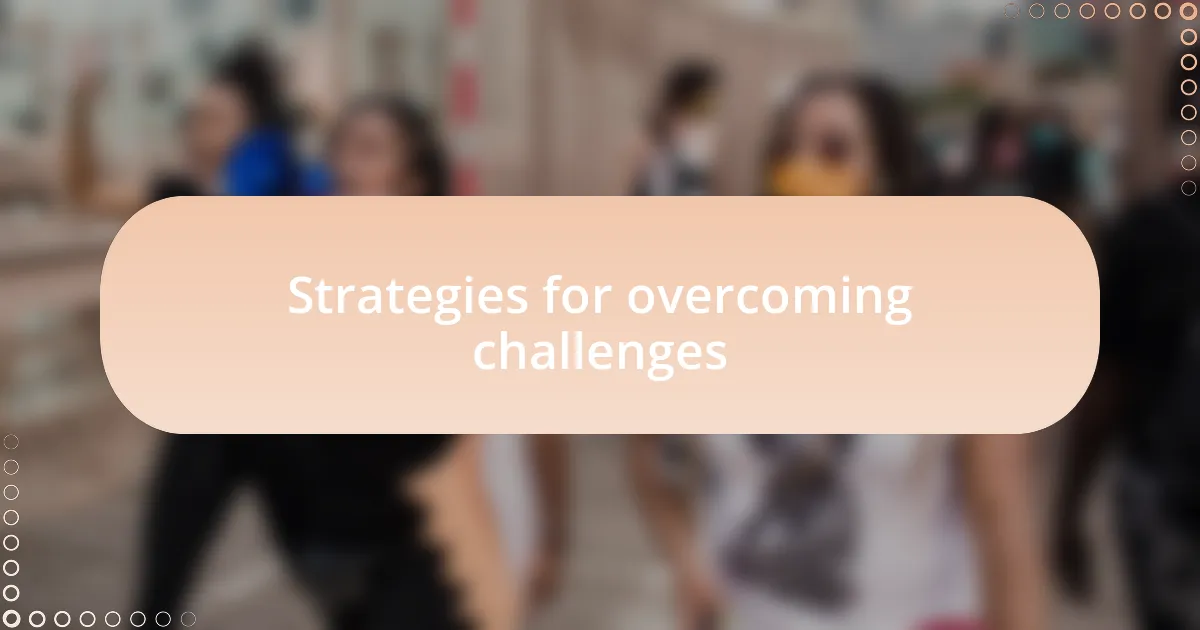
Strategies for overcoming challenges
I’ve faced numerous challenges in my advocacy journey, particularly when encountering resistance from those who don’t share my views. In one particular instance, after a heated debate at a local community meeting, I felt disheartened. However, I reminded myself that every conversation is an opportunity for understanding and growth. Have you ever thought about how these difficult exchanges can actually strengthen your resolve to advocate for what you believe in?
Another strategy that I found effective is seeking support from fellow activists. There have been days when my motivation waned, and I felt like giving up. During those times, connecting with others who share my passion reignited my fire. I recall a late-night phone call with a friend after a discouraging event; their encouragement reminded me that we’re not alone in this fight. Have you ever tapped into the power of community to bolster your spirits?
Lastly, I turn to self-reflection and mindfulness techniques to combat feelings of overwhelm. There’s something grounding about sitting quietly and reminding myself of the “why” behind my advocacy. I often write in my journal, which helps clarify my thoughts and emotions. Have you considered how a few moments of solitude can refocus your purpose? It’s a simple yet powerful way to navigate the emotional landscape of activism.